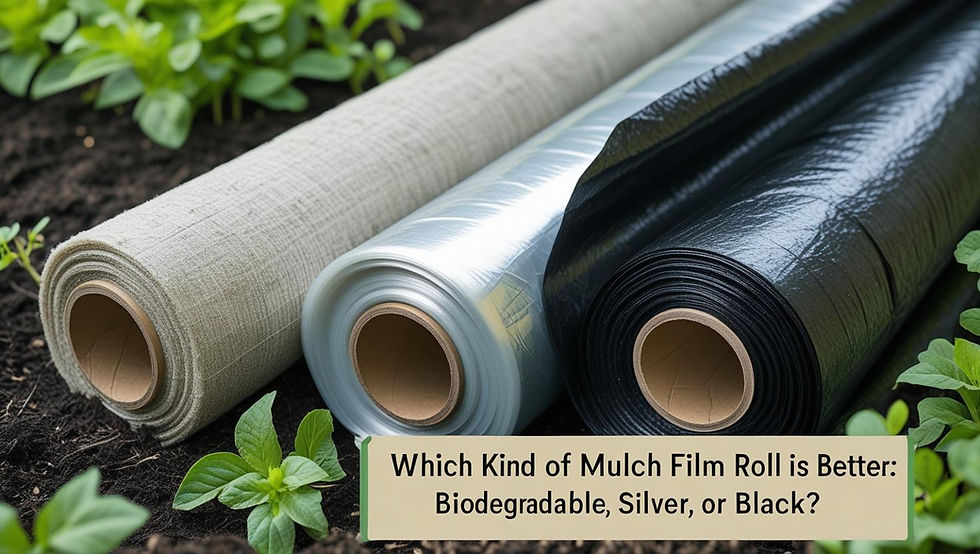The Best 5 Biodegradable Agricultural Mulch Film Choices for Long-Term Crop Development
- Rahul Solanki
- 8 minutes ago
- 4 min read

Introduction
In modern agriculture, the need for sustainable solutions has never been more urgent. One of the most impactful innovations is the use of biodegradable agricultural mulch film. These environmentally friendly substitutes for traditional plastic mulches improve soil health, control temperature, and inhibit weed growth while organically returning to the soil. Greener farming methods are also being aided by other sustainable materials, such as environmentally friendly shrink wrap in packaging and agricultural supply chains.
What is Biodegradable Agricultural Mulch Film?
A soil cover composed of organic or biodegradable polymers, biodegradable agricultural mulch film is intended to carry out the same tasks as traditional plastic mulch, such as regulating temperature, keeping soil moisture levels stable, and suppressing weeds, without leaving any hazardous residues. These films naturally break down into non-toxic components like water, carbon dioxide, and biomass, in contrast to conventional plastic mulch that needs to be removed by hand and frequently ends up in landfills.
Key Differences from Traditional Mulch
Traditional plastic mulch requires costly removal and disposal.
Biodegradable alternatives break down naturally in the soil.
Reduced carbon footprint due to renewable raw materials.
Environmental Advantages
Eliminates plastic waste accumulation in fields.
Enhances soil fertility by leaving no harmful residues.
Reduces labor and disposal costs for farmers.
Why Use Biodegradable Agricultural Mulch Film?
Using biodegradable agricultural mulch film offers multiple benefits that align with sustainable agriculture:
Improves Soil Health – By decomposing into organic matter, these films enrich soil fertility.
Suppresses Weed Growth – Prevents sunlight from reaching weeds, minimizing herbicide use.
Retains Moisture – Reduces water evaporation and enhances irrigation efficiency.
No Removal Required – Farmers save time and money since the mulch degrades naturally.
Sustainable Crop Development – Long-term improvements in soil and yield make it ideal for future farming practices.
Top 5 Biodegradable Agricultural Mulch Film Choices
1. Starch-Based Mulch Films
Derived from renewable resources like corn, potato, and wheat starch.
Break down naturally, integrating into the soil without residues.
Favored by organic farmers for sustainability.
2. PLA (Polylactic Acid) Mulch Films
Produced from fermented plant starch (like corn).
Strong and durable, ideal for effective weed suppression.
Completely biodegradable under industrial composting or controlled conditions.
3. PBAT (Polybutylene Adipate Terephthalate) Mulch Films
Known for excellent flexibility and tear resistance.
Balances durability and biodegradability, making it a reliable choice.
Popular among commercial farmers for long-term use.
4. Blended Biopolymer Mulch Films
Combine natural starches with biodegradable synthetic polymers.
Provide improved strength while remaining eco-friendly.
Suitable for extended crop cycles and varied climates.
5. Compostable Mulch Films
Certified compostable materials ensure complete eco-friendly breakdown.
Leave behind zero toxic residues.
Align perfectly with zero-waste agricultural practices.
How Eco Friendly Shrink Wrap Complements Mulch Films
In agriculture, sustainability encompasses not only crop growth but also distribution and packaging. Here, eco-friendly shrink wrap is essential:
Packaging Seeds and Fertilizers – Provides safe storage while minimizing plastic waste.
Sustainable Distribution – Used in wrapping harvested crops for transportation with lower environmental impact.
Circular Economy – Complements the use of biodegradable mulch by ensuring waste reduction across the entire supply chain.
Choosing the Right Biodegradable Agricultural Mulch Film
When selecting the best mulch for your farm, consider:
Soil Type – Different soils may favor different film compositions.
Crop Type – Some films are better suited for specific vegetables or grains.
Climate – Decomposition rates vary with temperature and rainfall.
Farming Scale – Commercial farming may prefer PBAT or blends, while small farms may favor starch-based options.
Cost and Certification – Ensure the mulch film is certified biodegradable and compostable by recognized authorities.
Conclusion
Using biodegradable agricultural mulch film is a step towards global sustainability, not just a farming decision. These films are transforming agriculture by decreasing plastic waste, improving soil, and saving farmers time and money. The entire agricultural value chain can transition to a more sustainable and environmentally friendly future when combined with solutions like environmentally friendly shrink wrap for packaging.
FAQs
1. What is the lifespan of biodegradable agricultural mulch film?
While PBAT and PLA-based films can last an entire crop cycle, starch-based films may only last two to four months. Climate, crop type, and soil all affect how quickly things break down.
2. Can biodegradable agricultural mulch film be used for all types of crops?
Indeed, it is adaptable and works well with grains, fruits, and vegetables. Farmers should, however, choose a mulch film type that corresponds with the crop's growing season.
3. How does biodegradable agricultural mulch film affect soil fertility?
As the film decomposes, it adds organic matter to the soil, increasing microbial activity and fertility.
4. Is eco friendly shrink wrap reusable or recyclable?
Yes. Many types of eco friendly shrink wrap are made to be recyclable, and depending on their thickness and use, some can even be reused. They are therefore a sustainable addition to biodegradable mulch.
5. Where can farmers buy certified biodegradable agricultural mulch film?
Farmers ought to buy from approved vendors who satisfy global requirements for compostability and biodegradability. To guarantee authenticity, always look for certifications such as ASTM D6400 or EN 13432.
For More Information Visit: Tilak Poly pack Pvt.Ltd



Comments